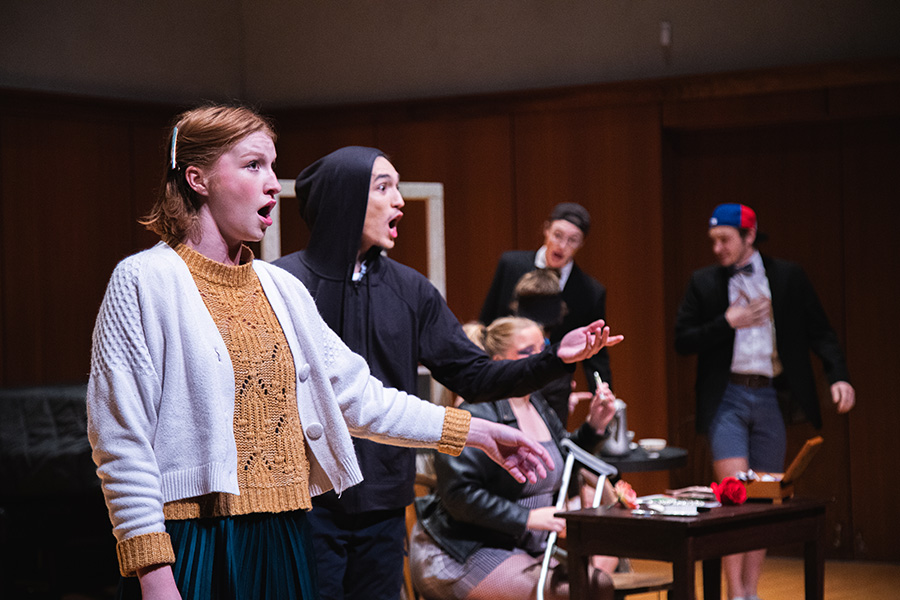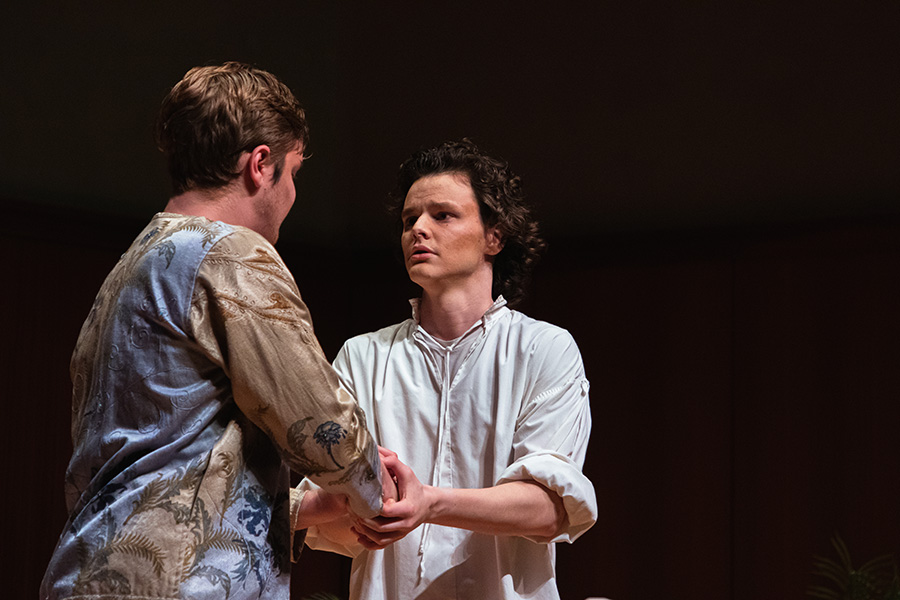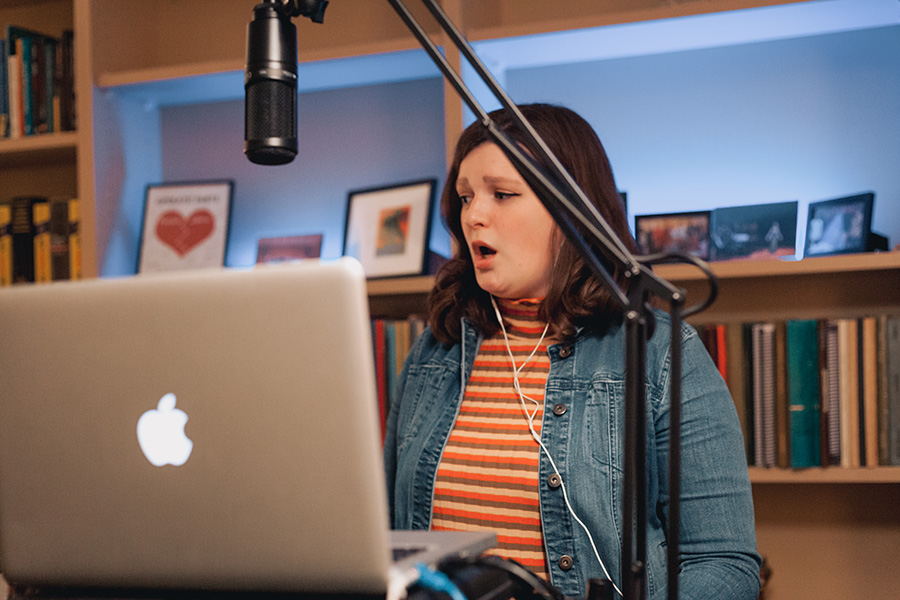The voice area is one of the largest study areas within the Luther College Music Department. Each voice teacher is viewed as an experienced professional in their area. Each voice student will be assigned their own voice seminar where they will study with that professor during their time at Luther. In each seminar, students of all years are performing and collaborating with each other. Students will comment on performance aspects they took note of and provide feedback based on their observations. Following each full semester, students majoring in voice will be asked to complete a jury. A jury is a performance for a panel of voice faculty where they will provide comments and a grade for each student. Ultimately, each students voice teacher will issue them a grade for the semester following their jury performance.
Voice Area Guidelines
Students register for the section of applied voice that corresponds to their studio teacher.
All students should register for MUS 130 during their first two semesters of study.
Non-majors, music minors who have already completed four semesters of study, and music majors in their secondary areas may repeat MUS 130 for credit in subsequent years.
Music majors whose primary instrument is voice and music minors should register for MUS 230 during the third and fourth semesters. Music majors whose primary instrument is voice should enroll in MUS 330 for the fifth and sixth semesters, and MUS 430 for the seventh and eighth semesters. With permission of the studio teacher, music majors in their secondary area, music minors, and non-majors may also enroll for lessons at the 230, 330, or 430 level.
Students who wish to give a recital must be registered for at least MUS 230 to sing a jury for recital approval; furthermore, they must be registered for at least MUS 330 in order to sing a recital.
Credits:
• 1 Credit Hour = 30 minutes of study/week and Voice Seminar
• 2 Credit Hours = 60 minutes of study/week and Voice Seminar
Voice Seminars are the weekly group meetings of each voice studio, and attendance at Voice Seminar is a mandatory and graded component of vocal study. In seminar, students have the opportunity to learn as a group, to perform for one another, and to cultivate the ability to offer constructive and relevant feedback. A brief oral presentation should precede each singer’s performance in seminar. This presentation, as well as the singing performance, will be part of the overall seminar grade.
Coaching: When approved by the individual voice instructor and by the vocal coach, students may register for Vocal Coaching (Music 360A) after four semesters of voice lessons. Students of sophomore standing may register for vocal coaching if approved by the voice instructor and the vocal coach, and if space is available.
The vocal coach will rarely, if ever, give technical guidance to a singer, but may make occasional observations concerning tone production with the expectation and full knowledge that the voice teacher will also address these technical matters. The voice teacher and vocal coach may both recommend vocal literature. To avoid any confusion that may arise by differences of opinion or interpretation, frequent, open communication among student, voice teacher, and coach is vital.
Since most vocal repertoire requires keyboard accompaniment, working regularly with a pianist is an important part of being a singer. Pianists can be found through recommendations of professors or friends, through the posted list of current pianists at Luther, or through the Vocal/Instrumental Accompanying class. Some basic guidelines regarding accompanists include:
- The accompanist should be available for a student’s weekly lesson,
regular rehearsals outside lessons, and semester juries. - It is the voice student’s responsibility to schedule a weekly lesson time
when the accompanist is consistently available. - The frequency with which accompanists will attend lessons is at the
discretion of the studio voice teacher. - It is the student’s responsibility to give music to the accompanist at least
three weeks before a performance or lesson. - It is expected that the singer and pianist will rehearse regularly to prepare
music for upcoming lessons and performances.
Definition: All first-year voice students, other beginning voice students registered at the 130 level, and students registered at the 230, 330, and 430 levels will sing for and be evaluated by members of the voice faculty during final exam week. If possible, students will sing in a jury location where that student’s applied teacher is adjudicating. Non-music majors (except first year or new voice students) registered at the 130 level are not required to sing a jury. Rarely, the applied instructor may request that a non-major registered for 130 sing a jury.
- The vocal jury provides a specific date by which performance preparation must be complete and gives closure to the semester’s work on repertoire. The jury is also an opportunity to receive feedback from several members of the voice faculty about one’s singing at that moment in time. This can be very helpful in planning work for the next semester or in preparing for the next performance. The jury is an opportunity to practice the skills of presentation, which range from appropriate attire to the ability to enter a room and deliver a committed, engaging performance. Juries can give feedback on how well one performs under pressure. For example, does the ability to breathe disintegrate when faced with the challenge of performing a jury? Is it difficult to remember the words and translation to a song in another language? Are all areas of the vocal range secure? Is performance anxiety a factor? Students can use the jury to notice patterns and work more effectively to change them.
- Required Repertoire: All students will bring a form to the jury that lists repertoire studied during the current semester. Repertoire that is prepared and memorized for the jury should be marked with an asterisk. Individual voice instructors will determine the number, language, and type of memorized pieces a student should offer to the jury panel. In the first semester of study at the MUS 130 level, the minimum acceptable number of memorized selections is two (2). In all subsequent semesters, at least three (3) memorized pieces are required. If a student sings an oratorio aria, it must either be memorized, or, if using a score, the oratorio selection should be in addition to the three memorized pieces. Students are strongly encouraged to offer more than the minimum number of required
pieces in order to demonstrate their command of musical preparation, language, and contrasting styles. As noted above, individual voice teachers may require a greater number of selections for their own students. Students will sing two (2) selections during a jury; the first selection is of the student’s choosing, and the second is chosen by the faculty panel. Usually, a student’s studio teacher recuses himself or herself from the choice of this second piece. The jury panel is free to hear portions or the entirety of any piece that is listed as memorized. - Evaluation Criteria: musical accuracy, musical expression, vocal technique, vocal progress, intonation, diction/articulation, interpretation/presentation, absence of excess physical tension.
- Note: Musical and textual accuracy is a minimum expectation. The voice faculty is interested in seeing evidence that students have worked beyond mere accuracy toward vocally, musically, and dramatically captivating performances.
- Suggested Appropriate Attire: As a singer, one’s appearance will affect how an audience perceives and evaluates a performance. A jury is a formal performance evaluating an entire semester’s work. Although attire will not impact one’s jury grade negatively, the voice faculty believes that performance dress should reflect and respect the significance of this event. Here are some examples of appropriate professional attire for a voice jury: a dress; a skirt and top; dress pants and top; dress pants with shirt, sweater, or shirt and tie; a suit. Please wear shoes in which you can stand and move comfortably. (Typically, it looks best to wear socks or hose as well.) Finally, please note that standards for dress in the music business are generally conservative. Very revealing clothing and/or exceptionally tight-fitting attire are usually not appropriate. When in doubt, ask a teacher.
- Make-up Jury: A grade of “Incomplete” will be assigned in a given semester only in the event of illness or emergency that prevents a student from completing the voice jury. Make-up juries will be held during the third week of the following semester. Students with a grade of “Incomplete” must sign up for and sing a make-up jury in order to receive graded credit for the previous semester. All of the above criteria apply to make-up juries.
- Jury for Recital Approval: Students who plan to sing a first recital one or two semesters subsequent to the current semester must sing a jury requesting recital approval. This occurs most commonly in the fourth semester of study. To emphasize the significance of this jury students must:
- Prepare and memorize a minimum of 4 pieces
- Provide a complete list of repertoire studied to date
- Provide a complete list of repertoire performed in public (voice instructor have examples of repertoire lists to assist students in their preparation)
- As in other juries, a student should sing in the location in which his/her teacher is adjudicating.
- MUS 130 Jury: Music majors will be reviewed at the end of the first year of study. At that time the jury panel, in consultation with the applied teacher, will make a recommendation as to whether or not a student is encouraged to continue in the major. If the panel does not recommend continuing in the major, the student may not register for MUS 230. For this jury, students should sing in a room in which their teacher is adjudicating.
- Refer to the Music Department Student Guidelines for departmental recital requirements regarding length, grading, location, dress rehearsals, and receptions.
- Performing a second recital: As stated in the Music Department Student
Guidelines:- “A music major who has given a junior degree recital may request permission to give a second recital (either half or full) in his/her senior year. The student’s teacher and the faculty in the appropriate area (voice) must approve a second recital.”
- Students planning to pursue a graduate degree in voice will be given preference for a full senior recital. Permission for a second half recital will be given at the discretion of the studio teacher and the voice faculty.
- Repertoire Standards for Recitals:
- All recital literature must meet the approval of the studio teacher.
- In an academic setting such as the Luther College Department of Music, the typical recital program should represent a balanced variety of musical eras, languages, composers, styles, and genres (art song, operatic aria, oratorio, etc.). A recital should include selections in Italian, German, French, and English, although another language could substitute for one of the required languages (e.g. Spanish could substitute for Italian). If the student and teacher agree to present jazz or musical theatre selections, such a group may be added only after the above expectations have been met.
- Solo performances are expected in degree recitals. Duets, trios, etc. and chamber music with instruments are valuable, but they should not comprise more than 25% of the total repertoire performed on the recital.
- A performance comprised primarily or entirely of musical theatre, jazz, etc. will be considered an elective recital rather than a junior or senior recital and must be performed in a space other than Noble Recital Hall.





